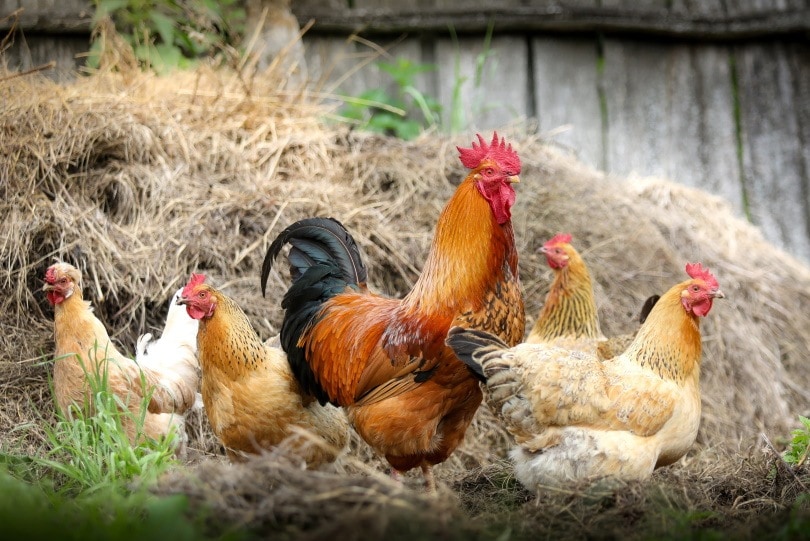Can I Feed Chickens Leftover Fried Rice

During the warmer months, chickens will eat a wide variety of plants and insects available to them. A chicken's foraging diet includes grass and other vegetation, berries, seeds, and insects. This lifestyle provides chickens with a variety of nutrients they need, such as vitamin B from the insects they consume and vitamin D from sun exposure. During the winter months, however, there isn't always a variety of flora and fauna for your chickens to forage. Sharing your table scraps with your chickens can be a great way to supplement their diets and ensure they are getting a variety of nutrients.
Cooked rice can be a great addition to your chickens' diets. In this article, we will discuss the nutritional benefits of cooked rice for chickens, what kind of rice chickens should eat, and which rice products you should avoid giving to your chickens.

What Are the Benefits of Eating Rice for Chickens?

You may not think of rice as having much nutritional value, but rice—particularly brown rice and wild rice—is full of minerals and nutrients. Let's break down some of the nutrients in rice and how they benefit your chickens.
Niacin
Niacin, also known as vitamin B3, is an essential nutrient for chickens, as well as ducks and other waterfowl. Niacin helps the nervous system and digestive system function. Young chicks that aren't getting enough niacin in their diet can develop a deficiency, which can lead to bowing of the legs, dermatosis, feathering issues, and feathering problems. Adults with a niacin deficiency may present with metabolic disorders.
Thiamine
Thiamine, or vitamin B1, is another important nutrient that affects your chickens' digestive system, heart, muscles, and nerves. Chicks and adults with a thiamine deficiency may experience tremors, an inability to stand upright, and a wry neck. Adults may also experience a lack of appetite that eventually leads to emaciation.
Selenium
Selenium plays an important role in egg production, egg hatching, and semen quality. If you live in an area where there is high selenium content in the soil, your backyard chickens may not need any additional selenium in their diet. Otherwise, providing your chickens with a balanced diet is key to ensuring they get enough selenium.
Magnesium
Magnesium contributes to bone formation and carbohydrate metabolism in chickens. It also appears to contribute to eggshell formation.
Pyridoxine
Pyridoxine, or vitamin B6, is another essential B vitamin. Vitamin B6 contributes to brain development and function and helps your chickens regulate their body clocks. It is also used to break down amino acids.

What Kind of Rice Should Chickens Eat?

Chickens can eat all varieties of plain, cooked rice. Since wild and brown rice are higher in nutrients than white rice, feeding your chickens these varieties will be the most beneficial to them. However, white rice is also fine for chickens to eat, especially as an occasional treat.
In addition to plain rice, you can also feed your chickens some other types of rice products such as plain rice cereal and rice cakes. Keep in mind that these are treats that should be fed to your chickens in moderation since they lack the nutritional value that can be found in plain cooked rice and other foods.
What About Uncooked Rice?
There is a rumor that says chickens cannot eat uncooked rice because it will make their stomachs swell and explode. This rumor is thought to originate with the tradition of throwing rice at weddings. People began to worry that eating the rice would unwittingly harm any birds who would come and help clean up after the festivities. In the 80s, many couples began phasing out rice in favor of birdseed at weddings in response to Connecticut state legislature that aimed to ban the practice of throwing rice.
Luckily, the rumor is not true. Eating uncooked rice will not make your chickens explode; in fact, chicken owners and scientists agree that both instant and regular uncooked rice are perfectly safe for chickens.
Which Rice Products Can Chickens Not Eat?
While chickens can eat uncooked rice, there are some rice products that chickens should not eat. Some examples include rice krispie treats, cocoa krispies, frosted krispies, and flavored rice mixes. These products are often very low in nutritional value and can lead to obesity and other problems in your chickens.
A great rule of thumb is to look at the nutrition label. If a product has a lot of added ingredients, particularly added sugar or sodium, you should not feed that product to your chickens.

The Bottom Line
Rice, both cooked and uncooked, can be a great addition to your chickens' diet. Be mindful of the rice product you are feeding them and steer clear of anything with a lot of additives. And of course, remember that variety is the spice of life; your chickens will enjoy the rice, but like you, they will benefit most from a well-rounded diet that includes many different types of foods.
Related Chicken Reads:
- Can Chickens Eat Pineapple? What You Need to Know!
- Can Chickens Eat Strawberries? What You Need to Know!
- Can Chickens Eat Broccoli? What You Need to Know!
Featured Image Credit: mikuratv, Pixabay
Source: https://petkeen.com/can-chickens-eat-cooked-rice/
0 Response to "Can I Feed Chickens Leftover Fried Rice"
Post a Comment